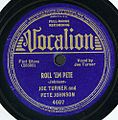Portal:Rock music
The Rock Music Portal
Rock is a broad genre of popular music that originated as "rock and roll" in the United States in the late 1940s and early 1950s, developing into a range of different styles from the mid-1960s, particularly in the United States and the United Kingdom. It has its roots in rock and roll, a style that drew directly from the genres of blues, rhythm and blues, and country music. Rock also drew strongly from genres such as electric blues and folk, and incorporated influences from jazz and other musical styles. For instrumentation, rock is typically centered on the electric guitar, usually as part of a rock group with electric bass guitar, drums, and one or more singers. Usually, rock is song-based music with a 4
4 time signature and utilizing a verse–chorus form, but the genre has become extremely diverse. Like pop music, lyrics often stress romantic love but also address a wide variety of other themes that are frequently social or political. Rock was the most popular genre of music in the U.S. and much of the Western world from the 1950s to the 2010s.
Rock musicians in the mid-1960s began to advance the album ahead of the single as the dominant form of recorded music expression and consumption, with the Beatles at the forefront of this development. Their contributions lent the genre a cultural legitimacy in the mainstream and initiated a rock-informed album era in the music industry for the next several decades. By the late 1960s "classic rock" period, a few distinct rock music subgenres had emerged, including hybrids like blues rock, folk rock, country rock, Southern rock, raga rock, and jazz rock, which contributed to the development of psychedelic rock, influenced by the countercultural psychedelic and hippie scene. New genres that emerged included progressive rock, which extended artistic elements, heavy metal, which emphasized an aggressive thick sound, and glam rock, which highlighted showmanship and visual style. In the second half of the 1970s, punk rock reacted by producing stripped-down, energetic social and political critiques. Punk was an influence in the 1980s on new wave, post-punk and eventually alternative rock.
From the 1990s, alternative rock began to dominate rock music and break into the mainstream in the form of grunge, Britpop, and indie rock. Further fusion subgenres have since emerged, including pop-punk, electronic rock, rap rock, and rap metal. Some movements were conscious attempts to revisit rock's history, including the garage rock/post-punk revival in the 2000s. Since the 2010s, rock has lost its position as the pre-eminent popular music genre in world culture, but remains commercially successful. The increased influence of hip-hop and electronic dance music can be seen in rock music, notably in the techno-pop scene of the early 2010s and the pop-punk-hip-hop revival of the 2020s. (Full article...)
General images -
Selected article
Bootlegs reached new popularity with Bob Dylan's Great White Wonder, a compilation of studio outtakes and demos released in 1969 using low-priority pressing plants. The following year, the Rolling Stones' Live'r Than You'll Ever Be, an audience recording of a late 1969 show, received a positive review in Rolling Stone. Subsequent bootlegs became more sophisticated in packaging, particularly the Trademark of Quality label with William Stout's cover artwork. Compact disc bootlegs first appeared in the 1980s, and Internet distribution became increasingly popular in the 1990s.
Changing technologies have affected the recording, distribution, and profitability of the bootlegging industry. The copyrights for the music and the right to authorise recordings often reside with the artist, according to several international copyright treaties. The recording, trading and sale of bootlegs continues to thrive, even as artists and record companies release official alternatives. (Full article...)
Selected biography
Jagger was born and grew up in Dartford. He studied at the London School of Economics before abandoning his studies to focus on his career with the Rolling Stones. In the early 1970s, Jagger starred in the films Performance (1970) and Ned Kelly (1970), to mixed receptions. Beginning in the 1980s, he released a number of solo works, including four albums and the single "Dancing in the Street", a 1985 duet with David Bowie that reached No. 1 in the UK and Australia and was a top-ten hit in other countries.
In the 2000s, Jagger co-founded a film production company, Jagged Films, and produced feature films through the company beginning with the 2001 historical drama Enigma. He was also a member of the supergroup SuperHeavy from 2009 to 2011. Although relationships with his bandmates, particularly Richards, deteriorated during the 1980s, Jagger has always found more success with the Rolling Stones than with his solo and side projects. He was married to Bianca Pérez-Mora Macias from 1971 to 1978, and has had several other relationships; he has eight children with five women.
In 1989, Jagger was inducted into the Rock and Roll Hall of Fame and, in 2004, into the UK Music Hall of Fame with the Rolling Stones. As a member of the Rolling Stones and as a solo artist, he reached No. 1 on the UK and US singles charts with 13 singles, the top 10 with 32 singles and the top 40 with 70 singles. In 2003, he was knighted for his services to popular music. Jagger is credited with being a trailblazer in pop music and with bringing a style and sex appeal to rock and roll that have been imitated and proven influential with subsequent generations of musicians. (Full article...)
Selected album
Bat Out of Hell II: Back into Hell is the sixth studio album by American rock singer Meat Loaf and the second one in the Bat Out of Hell trilogy, which was written and produced by Jim Steinman. It was released on September 14, 1993, sixteen years after Meat Loaf's first solo album Bat Out of Hell. The album reached number 1 in the United States, United Kingdom and Canada. Three tracks were released as singles, including "I'd Do Anything for Love (But I Won't Do That)", which reached number 1 in 28 countries.
The album was released by Virgin Records outside of North America, where it was released by MCA. The third part of the Bat trilogy, Bat Out of Hell III: The Monster Is Loose, was released in 2006.
Like the first album of the trilogy, Bat Out of Hell II was a commercial success. It sold over 14 million copies worldwide. (Full article...)
Selected song
"Live Forever" is a song by the English rock band Oasis. Written by Noel Gallagher, the song was released as the third single from their debut album Definitely Maybe (1994) on 8 August 1994, just prior to that album's release. Gallagher began writing the song in 1991, before he joined Oasis.
Inspired by the Rolling Stones' "Shine a Light", "Live Forever" features a basic song structure and lyrics with an optimistic outlook that contrasted with the attitude of the grunge bands popular at the time. The song was the first Oasis single to enter the top ten in the United Kingdom, and garnered critical acclaim. In 2017, lead singer Liam Gallagher declared it his favourite Oasis song. The British Phonographic Industry certified the song triple platinum in July 2024. Upon Oasis' reunion in August 2024, the song reached a new peak of number 8 on the UK Singles Chart. (Full article...)
Selected picture

Patti Smith performing at Provinssirock festival in Seinäjoki, Finland, June 2007.
Did you know (auto-generated)

- ... that heavy metal band Judas Priest took their name from Bob Dylan's song "The Ballad of Frankie Lee and Judas Priest"?
- ... that raw material waste from the West influenced a generation of rock music in China?
- ... that when rock musician Warren Zevon received a terminal diagnosis of lung cancer, he learned to "enjoy every sandwich"?
- ... that Canadian punk rock musician Talli Osborne had only briefly spoken to the frontman of NOFX before the band wrote a song about her?
- ... that during his tenure as Governor of Central Java, Muhammad Ismail banned rock music concerts and car rallies?
- ... that before charting on the UK Albums Chart with Are We There Yet?, the indie rock musician James Marriott had made a career of mocking other YouTubers' music?
Selected genre
Glam metal (also known as hair metal or pop metal) is a subgenre of heavy metal that features pop-influenced hooks and guitar riffs, upbeat rock anthems, and slow power ballads. It borrows heavily from the fashion and image of 1970s glam rock.
Early glam metal evolved directly from the glam rock movement of the 1970s, as visual elements taken from acts such as David Bowie, T. Rex, and the New York Dolls (and to a lesser extent, the punk and new wave movements taking place concurrently in New York City) were fused with the decidedly more heavy metal leaning and theatrical acts such as Alice Cooper and Kiss. The first examples of this fusion began appearing in the late 1970s and early 1980s in the United States, particularly on the Los Angeles Sunset Strip music scene. Early glam metal bands include Mötley Crüe, Hanoi Rocks, Ratt, Quiet Riot, Twisted Sister, Bon Jovi, and Dokken. Glam metal achieved significant commercial success from approximately 1982 to 1991, bringing to prominence bands such as Poison, Skid Row, Cinderella and Warrant. From a strictly visual perspective, glam metal is defined by flashy and tight-fitting clothing, makeup, and an overall androgynous aesthetic in which the traditional "denim & leather" aspect of heavy metal culture is replaced by spandex, lace, and usually heavy use of bright colours. (Full article...)
Selected audio
Related portals
WikiProjects
Things you can do
Expand: College rock, Electronic rock, Pop rock
Clean Up: Instrumental rock, Rap rock, New wave, Industrial rock, Progressive metal, Southern rock, Folk rock, Funk rock, Space rock
Add Sources: Pagan rock
Join one of the many WikiProjects pertaining to Rock music.
News
No recent news
More articles -
Californication is the seventh studio album by U.S. rock band Red Hot Chili Peppers, released on June 8, 1999, on Warner Bros. Records. It was produced by Rick Rubin. Along with Blood Sugar Sex Magik, Californication is one of the band’s best-selling albums.
Californication marked the return of guitarist John Frusciante, who'd previously appeared on Mother's Milk and Blood Sugar Sex Magik, and shifted the band's style. The lyrics incorporated the sexual innuendos already associated with the band, but added themes including death, California, suicide, drugs, globalization and travel. (Full article...)
More did you know...
- ... that David Bowie's first gig as lead singer was at the Green Man, Blackheath?
- ... that Carlton le Willows Academy alumni include cricketer Mark Footitt, Air Supply singer/guitarist Graham Russell, and balloonist Janet Folkes?
- ... that the video for Marilyn Manson's soft-rock ballad "Running to the Edge of the World" was widely condemned for its depiction of violence against women?
- ... that Susan Beschta was a punk rocker and federal judge?

- ... that the FM Non-Duplication Rule adopted by the FCC 60 years ago led to the creation of the album-oriented and classic rock radio formats?
- ... that The Elvis Dead, a retelling of Evil Dead II in the style of Elvis Presley, features songs such as "Standing in a State of Shock", "I've Been Possessed", and "Wrapped Up in Vines"?
Major topics
Subcategories
Associated Wikimedia
The following Wikimedia Foundation sister projects provide more on this subject:
-
Commons
Free media repository -
Wikibooks
Free textbooks and manuals -
Wikidata
Free knowledge base -
Wikinews
Free-content news -
Wikiquote
Collection of quotations -
Wikisource
Free-content library -
Wikiversity
Free learning tools -
Wikivoyage
Free travel guide -
Wiktionary
Dictionary and thesaurus














































